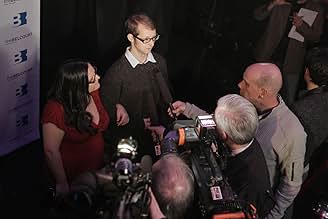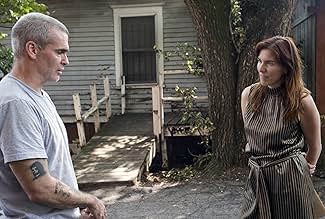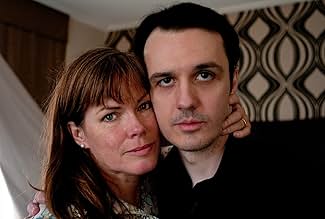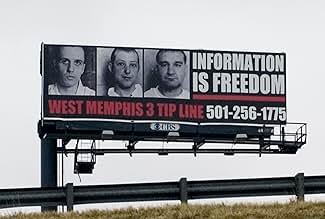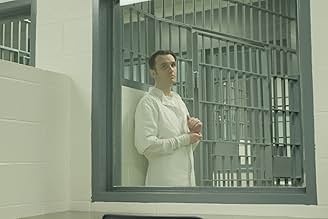ÉVALUATION IMDb
7,9/10
11 k
MA NOTE
Ajouter une intrigue dans votre langueAn examination of a failure of justice in the case against the West Memphis Three.An examination of a failure of justice in the case against the West Memphis Three.An examination of a failure of justice in the case against the West Memphis Three.
- Nominé pour le prix 1 BAFTA Award
- 1 victoire et 10 nominations au total
Jessie Misskelley
- Self
- (as Jessie Miskelly)
Michael Baden
- Self - Former New York City Chief Medical Examiner
- (as Dr. Michael Baden)
Jamie Clark Ballard
- Self - Neighbor of Stevie Branch
- (as Jamie Ballard)
Steve Braga
- Self - Damien Echols' Attorney
- (as Stephen Braga)
David Burnett
- Self - Trial Judge
- (as Judge David Burnett)
John Mark Byers
- Self - Christopher Byers' Father
- (as Mark Byers)
The Chicks
- Themselves
- (archive footage)
- (as Dixie Chicks)
Heather Crawford
- Self - TV News Anchor
- (archive footage)
Avis en vedette
While the story of the West Memphis Three, their awful flawed trial and subsequent efforts to obtain freedom were well covered in the "Paradise Lost" trilogy of films, this single film overview has a lot of value.
Perhaps because the case can now be looked back on in total, it feels like there is a clearer focus here than in the excellent "Paradise Lost" series. There also seems to be more of an emphasis on the emotion and humanity of all the victims – the three falsely convicted young men, but also the families that lost children.
Last, the film makes some of the awful holes in the prosecution case more simple and clear than earlier accounts, as well as putting a chilling spotlight on the possible real perpetrator, but without the theatrics that harmed 'Paradise Lost 2', which seemed guilty of what the trial did to the three boys; throw suspicion on a subject largely because he 'acted weird'.
Here the investigation into another possibility feels more dispassionate and scientific, and less manipulated, leaving one with questions rather than forcing conclusions.
The world might not have 'needed' another film on the subject, but personally, I feel the more injustice can be intelligently examined and exposed the better off we are as a society.
Perhaps because the case can now be looked back on in total, it feels like there is a clearer focus here than in the excellent "Paradise Lost" series. There also seems to be more of an emphasis on the emotion and humanity of all the victims – the three falsely convicted young men, but also the families that lost children.
Last, the film makes some of the awful holes in the prosecution case more simple and clear than earlier accounts, as well as putting a chilling spotlight on the possible real perpetrator, but without the theatrics that harmed 'Paradise Lost 2', which seemed guilty of what the trial did to the three boys; throw suspicion on a subject largely because he 'acted weird'.
Here the investigation into another possibility feels more dispassionate and scientific, and less manipulated, leaving one with questions rather than forcing conclusions.
The world might not have 'needed' another film on the subject, but personally, I feel the more injustice can be intelligently examined and exposed the better off we are as a society.
There's no such thing as a nice murder, but the deaths of three children in West Memphs, Arkansas in 1993 seemed particularly horrific: the killer had apparently cut off his victim's penises and drunk their blood before throwing the corpses into a creek. The police promptly rounded up some local kids with a passing interest in Satanism, and a conviction as duly secured. Only later, amid mounting concerns over a potential miscarriage of justice, did it emerge that an incompetent pathologist had failed to recognise that the wounds were almost certainly inflicted post-mortem, and not by the killer, but by turtles. Not only had the wrong people been convicted of the crime, but the crime was perhaps just an "ordinary" murder after all. But getting the State to agree was a further long struggle. Amy Berg's documentary charts the story. It's horrific (the crime was still an awful one, even if not quite as originally portrayed, and the false imprisonment of the accused a second tragedy), fascinating, and beautifully filmed. On the downside, it is a bit long, and while it does a good job at suggesting who might have actually committed the crime, one can feel a bit uneasy about making such charges in a film like this (although one can also note that the authorities seemingly have no interest in re-investigating the case). More than anything else, the film is an interesting (and scary) look into the life of the American poor, a long way from the glitz of Manhattan. For many of the people we see in this movie, life would have been a hard, tough grind, even without the terrible events displayed. When one of the three accused finally gets out of prison, he tells us he isn't going back to Arkansas; and one doesn't feel like blaming him.
The 'West Memphis 3' were first brought to my attention back in 2007/2008 when I viewed the astonishingly eye-opening documentary Paradise Lost: The Child Murders at Robin Hood Hills (1996), which I watched back-to-back with its sequel Revelations: Paradise Lost 2 (2000). The case was so fascinating due to its unbelievable revelations of the flaws in the American justice system that I was more than happy to spend over 5 enthralling hours of my night watching it unravel. Those films brought mass attention to the case, due to the fact that the three accused - Damien Wayne Echols, Jason Baldwin and Jessie Misskelley - were so blatantly innocent of this terrible crime. I assumed justice would prevail, and it soon left my mind. So it was shocking to learn upon the release of the third instalment of the trilogy, Paradise Lost 3: Purgatory (2011), and this, West of Memphis, that these three were still in prison, 19 years after the murders, with everything from mere bureaucracy and political motivations standing in their, and thousands of others, way.
For those unacquainted with the case, back in 1993, the mutilated bodies of three young boys - Christopher Byers, Steven Branch and Michael Moore - were found in a stream in the Robin Hood Hills, West Memphis. With no evidence, prosecutors quickly deemed the murders a result of Satanic ritual, due to (apparently) sexual mutiliation, and sought out any locals known to practise such an art. They were given the names of three youngsters, Echols, Baldwin and Miskelley, who were known to listen to heavy metal music and act much like your typical isolated, 'gothic' teenagers. Through manipulation of the jury, and a trial by media, the three were quickly convicted (again, with no evidence against them, apart from a heavily dubious 'confession' by the borderline mentally retarded Misskelley). They were given life, with Echols possibly facing the death sentence. Interest in the case quickly gathered, due to many aspects not making any sense, and gathered support of musicians such as Metallica, Henry Rollins, Patti Smith, and Eddie Vedder of Pearl Jam. West of Memphis focuses on the fight to free the West Memphis 3, with new evidence gathered and possibly a revelation as to who the killer may actually be.
West of Memphis doesn't spend much time treading the same ground as the Paradise Lost trilogy, and quickly covers the original trial. It consists mainly of original footage, such as the lawyers and investigators funded by supporters of the West Memphis 3 and various celebrities such as the film's producers Peter Jackson and Fran Walsh trying to find fresh evidence in favour of the 3, and footage of the various concerts designed to raise awareness and make money. But where West of Memphis truly invigorates is the alarming case built against Terry Hobbs, stepfather of Steven Branch, who was all but ignored by police in the original investigation. Paradise Lost 2 brought up the possibility of another stepfather, John Mark Byers, being the culprit, but often felt like he was a suspect due to him simply being quite strange, which seems hypocritical considering the West Memphis 3 were convicted for the same reason. But there is strong evidence against Hobbs, such as a violent past, the lack of an alibi during the time of the deaths, and his hair being found within the knot of the shoelaces to which the three boys were hog-tied with.
Above all, West of Memphis is a staunch reminder of the darkness of this case. This was a horrific crime, almost beyond belief (and the sights of the three corpses really hammers this home), and an equally disturbing path of 'justice' that followed. This is a deep, dark stain on the American justice system, where political aspirations, ignorance and outright lying stand in the way of true justice. They do walk free in the end, but not without leaving a bitter taste in the mouth. They had 19 years of their life stolen from them, yet to be free they must plead guilty to a crime everyone knows they did commit. In the eyes of the law, the West Memphis 3 are child murderers, while the real murderer walks free with a clean name. The Paradise Lost films and West of Memphis, if anything, are a testament to the power of film, along with Errol Morris' The Thin Blue Line (1988), which exposed police ineptitude and helped set an innocent man free, but above all else, they are a terrifying and utterly depressing indictment of a country that needs to take a good look at itself.
www.the-wrath-of-blog.blogspot.com
For those unacquainted with the case, back in 1993, the mutilated bodies of three young boys - Christopher Byers, Steven Branch and Michael Moore - were found in a stream in the Robin Hood Hills, West Memphis. With no evidence, prosecutors quickly deemed the murders a result of Satanic ritual, due to (apparently) sexual mutiliation, and sought out any locals known to practise such an art. They were given the names of three youngsters, Echols, Baldwin and Miskelley, who were known to listen to heavy metal music and act much like your typical isolated, 'gothic' teenagers. Through manipulation of the jury, and a trial by media, the three were quickly convicted (again, with no evidence against them, apart from a heavily dubious 'confession' by the borderline mentally retarded Misskelley). They were given life, with Echols possibly facing the death sentence. Interest in the case quickly gathered, due to many aspects not making any sense, and gathered support of musicians such as Metallica, Henry Rollins, Patti Smith, and Eddie Vedder of Pearl Jam. West of Memphis focuses on the fight to free the West Memphis 3, with new evidence gathered and possibly a revelation as to who the killer may actually be.
West of Memphis doesn't spend much time treading the same ground as the Paradise Lost trilogy, and quickly covers the original trial. It consists mainly of original footage, such as the lawyers and investigators funded by supporters of the West Memphis 3 and various celebrities such as the film's producers Peter Jackson and Fran Walsh trying to find fresh evidence in favour of the 3, and footage of the various concerts designed to raise awareness and make money. But where West of Memphis truly invigorates is the alarming case built against Terry Hobbs, stepfather of Steven Branch, who was all but ignored by police in the original investigation. Paradise Lost 2 brought up the possibility of another stepfather, John Mark Byers, being the culprit, but often felt like he was a suspect due to him simply being quite strange, which seems hypocritical considering the West Memphis 3 were convicted for the same reason. But there is strong evidence against Hobbs, such as a violent past, the lack of an alibi during the time of the deaths, and his hair being found within the knot of the shoelaces to which the three boys were hog-tied with.
Above all, West of Memphis is a staunch reminder of the darkness of this case. This was a horrific crime, almost beyond belief (and the sights of the three corpses really hammers this home), and an equally disturbing path of 'justice' that followed. This is a deep, dark stain on the American justice system, where political aspirations, ignorance and outright lying stand in the way of true justice. They do walk free in the end, but not without leaving a bitter taste in the mouth. They had 19 years of their life stolen from them, yet to be free they must plead guilty to a crime everyone knows they did commit. In the eyes of the law, the West Memphis 3 are child murderers, while the real murderer walks free with a clean name. The Paradise Lost films and West of Memphis, if anything, are a testament to the power of film, along with Errol Morris' The Thin Blue Line (1988), which exposed police ineptitude and helped set an innocent man free, but above all else, they are a terrifying and utterly depressing indictment of a country that needs to take a good look at itself.
www.the-wrath-of-blog.blogspot.com
West of Memphis (2012)
**** (out of 4)
This here is basically the fourth documentary to take a look at the West Memphis Three case, which gained worldwide attention after the PARADISE LOST trilogy. Countless celebrities including Johnny Depp, Eddie Vedder, Henry Rollins and Peter Jackson came to the three men's cause and they are also featured here.
So what this fourth film basically does is give you an overview of the case as well as new bits of information regarding who the killer might be. Let me start off by saying that this is a wonderfully entertaining film even though it is hard to watch at times since crime photos are shown in great detail. In fact, I will say that all four films on the subject were wonderful and certainly highly entertaining.
With that said, as they bring up in this movie, the case will always be controversial with some believing the three men are guilty and others believing that they were set up by some crooked cops. Some believe that the media attention got three killers off with murder while others believe that the media forced the state of Arkansas to set the guys free. Even at the end, the controversy continues as the three men admit to be guilty but take a loophole law to say they're also innocent.
I must admit that the PARADISE LOST series tried to place blame on one of the stepfather's but that person is shown as a great guy here. A new suspect is brought into play with evidence linking him to the crime but due to this loophole he will never be brought to trial. All four movies have demanded that the three men be released from prison and they have been. My question is now: what about the person who committed the crimes? What about the parents to the three murdered children? Is anything being done for them?
**** (out of 4)
This here is basically the fourth documentary to take a look at the West Memphis Three case, which gained worldwide attention after the PARADISE LOST trilogy. Countless celebrities including Johnny Depp, Eddie Vedder, Henry Rollins and Peter Jackson came to the three men's cause and they are also featured here.
So what this fourth film basically does is give you an overview of the case as well as new bits of information regarding who the killer might be. Let me start off by saying that this is a wonderfully entertaining film even though it is hard to watch at times since crime photos are shown in great detail. In fact, I will say that all four films on the subject were wonderful and certainly highly entertaining.
With that said, as they bring up in this movie, the case will always be controversial with some believing the three men are guilty and others believing that they were set up by some crooked cops. Some believe that the media attention got three killers off with murder while others believe that the media forced the state of Arkansas to set the guys free. Even at the end, the controversy continues as the three men admit to be guilty but take a loophole law to say they're also innocent.
I must admit that the PARADISE LOST series tried to place blame on one of the stepfather's but that person is shown as a great guy here. A new suspect is brought into play with evidence linking him to the crime but due to this loophole he will never be brought to trial. All four movies have demanded that the three men be released from prison and they have been. My question is now: what about the person who committed the crimes? What about the parents to the three murdered children? Is anything being done for them?
Alright, let me be completely honest with you about how I stumbled upon this documentary.
For most of my life, I had no idea who or what the West Memphis 3 were. I'm a 23 year old girl, living in Toronto. When these crimes were committed, I was in kindergarten likely learning how to read. So the fact I never heard of the crime never exactly surprised me. And if it wasn't for Johnny Depp, I probably would have never heard of the crimes to begin with.
I first learned about the West Memphis 3 watching a Johnny Depp interview on David Letterman. I was intrigued, looked up the case, became slightly disturbed, and unfortunately, forgot about it for a while. I hadn't actually heard about the case again until TIFF announced the final films in its 2012 program. West of Memphis sounded familiar, and low and behold, it had been the topic of the discussion in that said interview. After reading that Depp was attending and discussing the film after, I purchased the tickets.
Now I'll be honest, it may be slightly sad or pathetic, but Johnny Depp was the main reason I decided to see West of Memphis. I'm a huge fan of his work, and I had the opportunity to see him discuss a film, so of course I was getting the tickets. I realized after the film, if it wasn't for Depp I'd never even know about the West Memphis 3, and that made me realize how much the media and publicity truly helped their case. I barely knew a thing about them before I walked into the screening, but coming out, I was glad I blindly followed Depp towards it.
West of Memphis tells a true story that the world needs to hear. It's a film that I sincerely believe everyone needs to see simply so they can be aware of how cruel the justice system really can be.
he story of the Memphis 3 is eye opening, and disturbing. It's terrifying to know how badly the justice system can fail somebody. For nearly two decades Damien Echols, Jason Misskelley and Jason Baldwin sat behind bars for no real reason, while a murderer walked free. The crimes they were charged with were absolutely horrendous, and they were suspects purely because they fit a stereotype. That fact alone is just plain wrong. Facts were ignored, forensics were wrong, and three young men suffered due to the failure and lies of others. Stuff like this shouldn't happen, but yet it does. The worst part about it all is that the three men are still technically guilty. They may be free from imprisonment, but they're not innocent in the eyes of the law.
I'm not normally very big on documentaries, but I think this is an important film to watch purely because it's a crime and trial that shouldn't be forgotten. The film is over, but the story isn't. Justice hasn't been served yet, and that's something that needs to change.
For more reviews check out http://confessionsfilmaholic.blogspot.ca/
For most of my life, I had no idea who or what the West Memphis 3 were. I'm a 23 year old girl, living in Toronto. When these crimes were committed, I was in kindergarten likely learning how to read. So the fact I never heard of the crime never exactly surprised me. And if it wasn't for Johnny Depp, I probably would have never heard of the crimes to begin with.
I first learned about the West Memphis 3 watching a Johnny Depp interview on David Letterman. I was intrigued, looked up the case, became slightly disturbed, and unfortunately, forgot about it for a while. I hadn't actually heard about the case again until TIFF announced the final films in its 2012 program. West of Memphis sounded familiar, and low and behold, it had been the topic of the discussion in that said interview. After reading that Depp was attending and discussing the film after, I purchased the tickets.
Now I'll be honest, it may be slightly sad or pathetic, but Johnny Depp was the main reason I decided to see West of Memphis. I'm a huge fan of his work, and I had the opportunity to see him discuss a film, so of course I was getting the tickets. I realized after the film, if it wasn't for Depp I'd never even know about the West Memphis 3, and that made me realize how much the media and publicity truly helped their case. I barely knew a thing about them before I walked into the screening, but coming out, I was glad I blindly followed Depp towards it.
West of Memphis tells a true story that the world needs to hear. It's a film that I sincerely believe everyone needs to see simply so they can be aware of how cruel the justice system really can be.
he story of the Memphis 3 is eye opening, and disturbing. It's terrifying to know how badly the justice system can fail somebody. For nearly two decades Damien Echols, Jason Misskelley and Jason Baldwin sat behind bars for no real reason, while a murderer walked free. The crimes they were charged with were absolutely horrendous, and they were suspects purely because they fit a stereotype. That fact alone is just plain wrong. Facts were ignored, forensics were wrong, and three young men suffered due to the failure and lies of others. Stuff like this shouldn't happen, but yet it does. The worst part about it all is that the three men are still technically guilty. They may be free from imprisonment, but they're not innocent in the eyes of the law.
I'm not normally very big on documentaries, but I think this is an important film to watch purely because it's a crime and trial that shouldn't be forgotten. The film is over, but the story isn't. Justice hasn't been served yet, and that's something that needs to change.
For more reviews check out http://confessionsfilmaholic.blogspot.ca/
Le saviez-vous
- AnecdotesToutes les informations contiennent des divulgâcheurs
- Citations
Damien Wayne Echols: The thing I like most about time is that it's not real. It's all in the head. Sure, it's a useful trick if you wanna meet someone at a specific place in the universe to have tea or coffee. But that's all it is, a trick. There's no such thing as the past, it exists only in the memory. There's no such thing as the future, it exists only in our imagination. If our watches were truly accurate the only thing they would ever say is now.
- ConnexionsFeatured in At the Movies: Episode #10.1 (2013)
- Bandes originalesThe Times They Are a-Changin'
Written by Bob Dylan
Performed by Eddie Vedder
Published by Special Rider Music (SESAC)
Courtesy of Fearless Films
Meilleurs choix
Connectez-vous pour évaluer et surveiller les recommandations personnalisées
- How long is West of Memphis?Propulsé par Alexa
Détails
- Date de sortie
- Pays d’origine
- Sites officiels
- Langue
- Aussi connu sous le nom de
- 非法的正義
- Lieux de tournage
- sociétés de production
- Consultez plus de crédits d'entreprise sur IMDbPro
Box-office
- Brut – États-Unis et Canada
- 310 154 $ US
- Fin de semaine d'ouverture – États-Unis et Canada
- 13 360 $ US
- 30 déc. 2012
- Brut – à l'échelle mondiale
- 318 317 $ US
- Durée
- 2h 27m(147 min)
- Couleur
- Mixage
- Rapport de forme
- 1.85 : 1
Contribuer à cette page
Suggérer une modification ou ajouter du contenu manquant








